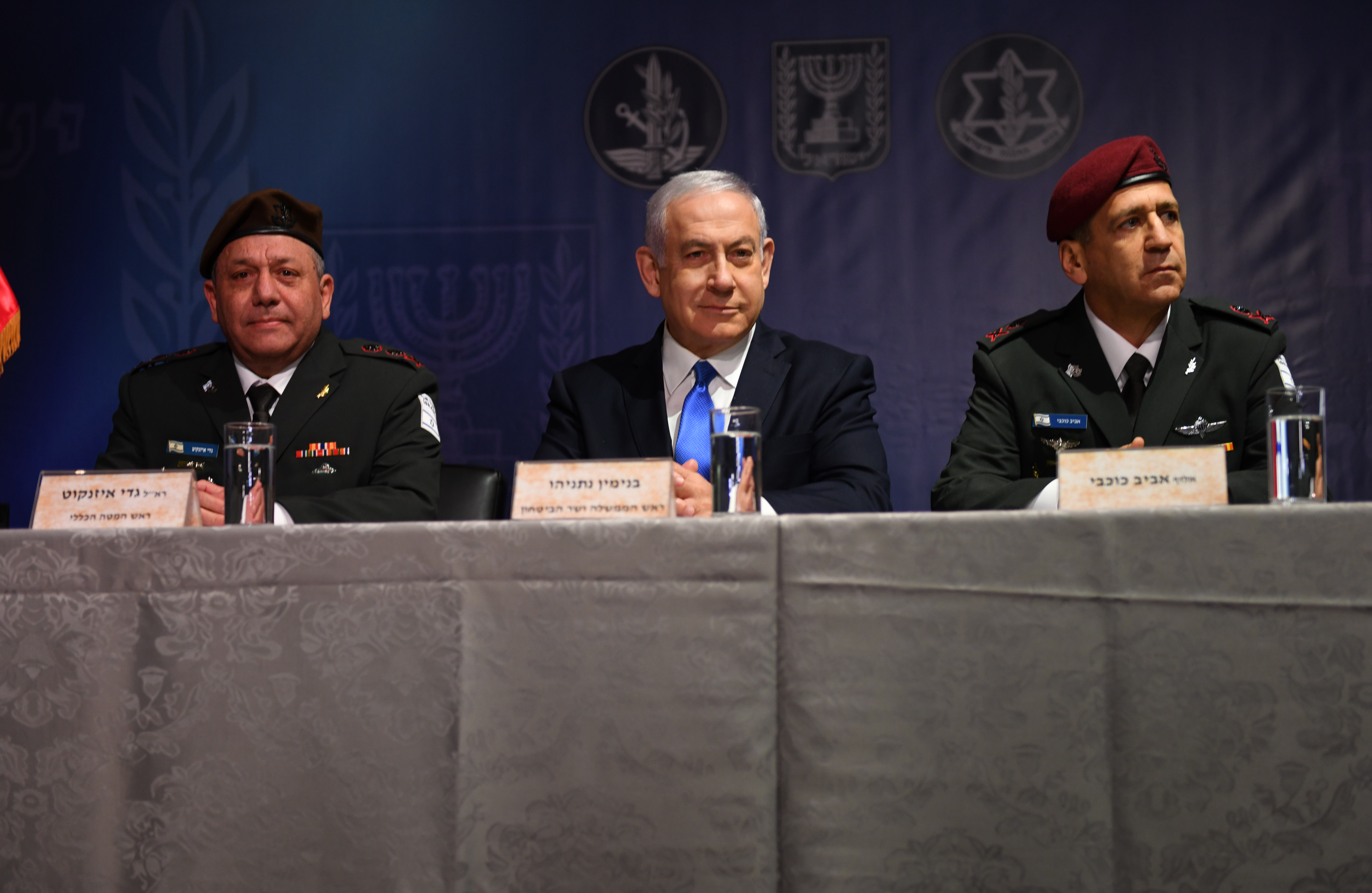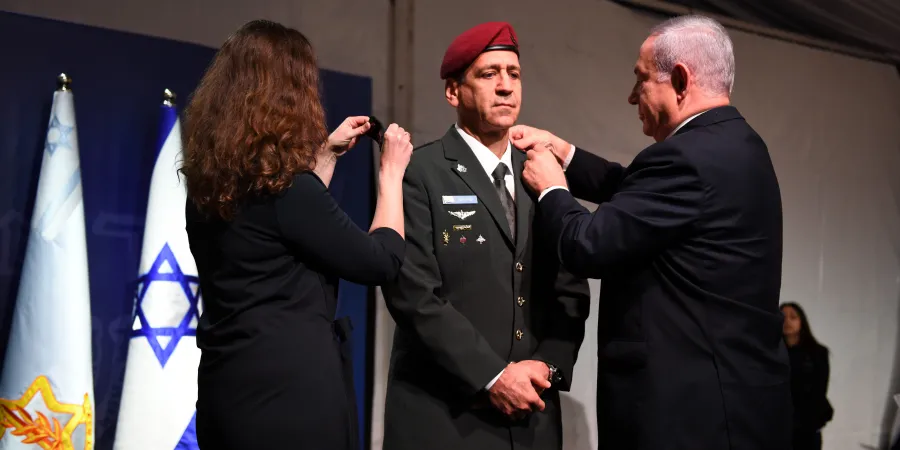New IDF Chief Pledges to Lead “Lethal, Efficient and Innovative Army”
Lt. Gen. Aviv Kochavi took over Tuesday as the 22nd commander of the Israel Defense Forces, replacing outgoing chief Gadi Eizenkot. “I assume the role with reverence and see it as a privilege,” Kochavi said
IsraelDefense
| 15/01/2019
Lt. Gen. Aviv Kochavi officially became the IDF’s 22nd chief of staff on Tuesday, taking over from Lt. Gen. (res.) Gadi Eizenkot at a ceremony at the IDF Headquarters in Tel Aviv.
“I look at this position with reverence, I see it as an honor,” Kochavi said after he received his new rank by his wife and Prime Minister Benjamin Netanyahu.
“’I swear.’ This is what I called out alongside my fellow soldiers in front of the Western Wall, which was for us a wall of support and protection. It has been 2,000 years, and this wall of protection has expanded and become the Israel Defense Force. I swore in front of generations of soldiers and became another link in the chain of generations that come each in turn to defend the state,” Kochavi said at the ceremony.
“’I swear,’ every soldier calls out, and packs into these two words the relinquishing of the private for the national. The national home is a wonderful creation like no other in the history of nations, but it is planted in a region that for religious and national reasons is trying to reject its natural roots. To defend our national home, we need a sobered outlook, a fit military force, the willingness to use that force, discretion, and determination,” he continued.
“Like every soldier in the presence of the oath, I too undertook to devote all my efforts to the defense of the homeland. Now, as Chief of the General Staff, with national security and the good of the State before me, I swear again.”
Thanking Eizenkot for his work under which, he said, the IDF bolstered its troops and increased its preparedness, Kochavi pledged “to dedicate all my energies, in a critical and stern manner, to strengthening our defensive wall and adapting it to the challenges of the present and the future, with the aim of increasing our ability to harm the enemy.” The new chief vowed to “keep the army a lethal, efficient, and innovative force.”

At the ceremony, Eizenkot, who is leaving the IDF after 40 years of service, said that one of his first goals as chief of staff was to build a “competent, ready and powerful army that strengthens its power with wisdom and determination.”
“In the past four years, the IDF has scored remarkable achievements, carried out thousands of powerful and precise strikes, and has positioned itself in the eyes of its enemies as a sophisticated, surprising and creative army,” he said, adding that the security of the state depends on “long and significant operations, both overt and covert,” the results of which “are evident across the borders and across the Middle East.”
“Only those who witnessed the intensity that was used every night, compared to the quiet that the citizens of Israel woke up to every morning, can attest to the readiness of the IDF for war and the IDF’s deterrent power. We chose to deal with the strong enemy. Every day, our force is successfully tested against preventing the Iranian entrenchment in Syria and stopping the arming of Hezbollah in Lebanon.”
Turning to Kochavi, the outgoing chief of staff said he had been privileged to work with him both in the field and in the general staff, recognizing him “as a commander with the strengths and abilities of leadership and command, who can and will be able to withstand the most complex challenges.”
“Proudly I pass on to you the command over the most precious asset of our nation – the Israel Defense Forces. The command over the military is passed on today to you, Lt. Gen. Aviv Kochavi, a commander worthy like no other to stand at the head of the Israel Defense Forces.”
Prime Minister and Defense Minister Netanyahu spoke about Israel's struggle to keep Iran from attaining nuclear weapons. “We must poke holes in Iran's lies. We made that apparent with the revelation of Israel's secret nuclear archive. We did it by destroying the attempted preparations of Hezbollah. I advise them to leave [Syria] quickly, because we will continue with our assertive policy, as promised, without fear and without a break. All of our efforts at building our power in the past few years are aimed at making sure that the army is ready for a single goal – victory in war. And the stronger we are, the better our chances are at peace.”
“I am not looking for excessive wars, yet in necessary wars, we will be asked to show true sacrifice,” the prime minister added.
“I will repeat, in conclusion, what I said here two days ago (at Eizenkot's goodbye ceremony): If we defend our nation with all our strength, then it will be unnecessary to set out on a full campaign. And if it is necessary – the Israeli army will rise to the challenge. The citizens of Israel will rise to the challenge, unified and united in the face of it, and together we will assure Israel's continuation and victory.”
[Sources: The Jerusalem Post, Haaretz]
Photo credit: Ariel Hermoni / IMOD
Lt. Gen. Aviv Kochavi took over Tuesday as the 22nd commander of the Israel Defense Forces, replacing outgoing chief Gadi Eizenkot. “I assume the role with reverence and see it as a privilege,” Kochavi said
Lt. Gen. Aviv Kochavi officially became the IDF’s 22nd chief of staff on Tuesday, taking over from Lt. Gen. (res.) Gadi Eizenkot at a ceremony at the IDF Headquarters in Tel Aviv.
“I look at this position with reverence, I see it as an honor,” Kochavi said after he received his new rank by his wife and Prime Minister Benjamin Netanyahu.
“’I swear.’ This is what I called out alongside my fellow soldiers in front of the Western Wall, which was for us a wall of support and protection. It has been 2,000 years, and this wall of protection has expanded and become the Israel Defense Force. I swore in front of generations of soldiers and became another link in the chain of generations that come each in turn to defend the state,” Kochavi said at the ceremony.
“’I swear,’ every soldier calls out, and packs into these two words the relinquishing of the private for the national. The national home is a wonderful creation like no other in the history of nations, but it is planted in a region that for religious and national reasons is trying to reject its natural roots. To defend our national home, we need a sobered outlook, a fit military force, the willingness to use that force, discretion, and determination,” he continued.
“Like every soldier in the presence of the oath, I too undertook to devote all my efforts to the defense of the homeland. Now, as Chief of the General Staff, with national security and the good of the State before me, I swear again.”
Thanking Eizenkot for his work under which, he said, the IDF bolstered its troops and increased its preparedness, Kochavi pledged “to dedicate all my energies, in a critical and stern manner, to strengthening our defensive wall and adapting it to the challenges of the present and the future, with the aim of increasing our ability to harm the enemy.” The new chief vowed to “keep the army a lethal, efficient, and innovative force.”

At the ceremony, Eizenkot, who is leaving the IDF after 40 years of service, said that one of his first goals as chief of staff was to build a “competent, ready and powerful army that strengthens its power with wisdom and determination.”
“In the past four years, the IDF has scored remarkable achievements, carried out thousands of powerful and precise strikes, and has positioned itself in the eyes of its enemies as a sophisticated, surprising and creative army,” he said, adding that the security of the state depends on “long and significant operations, both overt and covert,” the results of which “are evident across the borders and across the Middle East.”
“Only those who witnessed the intensity that was used every night, compared to the quiet that the citizens of Israel woke up to every morning, can attest to the readiness of the IDF for war and the IDF’s deterrent power. We chose to deal with the strong enemy. Every day, our force is successfully tested against preventing the Iranian entrenchment in Syria and stopping the arming of Hezbollah in Lebanon.”
Turning to Kochavi, the outgoing chief of staff said he had been privileged to work with him both in the field and in the general staff, recognizing him “as a commander with the strengths and abilities of leadership and command, who can and will be able to withstand the most complex challenges.”
“Proudly I pass on to you the command over the most precious asset of our nation – the Israel Defense Forces. The command over the military is passed on today to you, Lt. Gen. Aviv Kochavi, a commander worthy like no other to stand at the head of the Israel Defense Forces.”
Prime Minister and Defense Minister Netanyahu spoke about Israel's struggle to keep Iran from attaining nuclear weapons. “We must poke holes in Iran's lies. We made that apparent with the revelation of Israel's secret nuclear archive. We did it by destroying the attempted preparations of Hezbollah. I advise them to leave [Syria] quickly, because we will continue with our assertive policy, as promised, without fear and without a break. All of our efforts at building our power in the past few years are aimed at making sure that the army is ready for a single goal – victory in war. And the stronger we are, the better our chances are at peace.”
“I am not looking for excessive wars, yet in necessary wars, we will be asked to show true sacrifice,” the prime minister added.
“I will repeat, in conclusion, what I said here two days ago (at Eizenkot's goodbye ceremony): If we defend our nation with all our strength, then it will be unnecessary to set out on a full campaign. And if it is necessary – the Israeli army will rise to the challenge. The citizens of Israel will rise to the challenge, unified and united in the face of it, and together we will assure Israel's continuation and victory.”
[Sources: The Jerusalem Post, Haaretz]
Photo credit: Ariel Hermoni / IMOD



